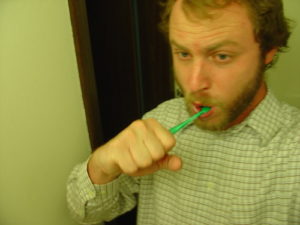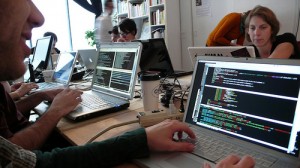
Matt brushing his teeth–usually he does this at home, not at Cohere.
When I started “freelancing,” I had a lot of expectations as to what my life would be like setting my own schedule, picking my own projects, etc. My life would be ultra-flexible and I would be spending my time doing something I loved, coding. I wouldn’t have anyone to answer to but myself, and that would be the ideal work environment.
It turned out that while there are many benefits to freelancing, for me, the flexibility and lack of direct accountability were not so high on the list.
Working from home, I could pace for hours before starting a project. Most of my days and nights consisted of over-planning, procrastinating, and then a 10-12 hour block of anxious, frenzied coding, and I was exhausted. My work life had lost its boundaries.
I would pick up projects that required me to work on-site from time to time. While working in an office, there was an expectation that I would spend my paid hours coding, so I would dive right in. I would take things in smaller chunks. The solutions to small problems would seem to roll right out of my fingers. I wasted far less time by writing, adjusting, redirecting, tightening, than I would trying to pull everything together in my head and then drop it into code as one solid system. So that seemed to be a solution. Stop over-planning and getting excited, and just sit down and code.
A little social pressure helped reduce my coding anxiety, helped me be more efficient, and helped me to do something that I really loved to do, write nice code. Coworking, working in a social setting, provided just enough social pressure. So my expectations of coworking were simple: Social pressure would keep me efficient.

People coworking (not at Cohere but this is kind of what his screen looks like)
While coworking has done wonders to keep me efficient and reduce my coding anxiety, I’m starting to realize that “social pressure” is really one of the very smallest benefits of working in a more “social” environment. I’m starting to realize that my work exists within an ecosystem of other projects, built by other people like me, and networking is an essential part of the freelancer’s life.
It’s becoming increasingly important as more people are becoming freelancers.
The best projects I’ve worked on, I’ve found word of mouth. I’m getting more interested in sharing my ideas, in blogging, in building my projects open-source and contributing to other open-source projects. I’m starting to think of my work as less of a “job” and more as a part of an ecosystem that will sustain me as I contribute to it.
I’m also starting to realize that “making money”, while it’s a necessary and much appreciated part of “what I do”, it’s no longer the end goal. It’s just one of the outcomes of how I spend my time. Taking a step back, I could say that capitalism is a useful tool for getting parts of the economy and people in general moving and productive, but it’s not always the best tool. If you look at the thriving open source community, some of it is funded and paid, a lot of it is built and shared without the money changing hands directly.
Maybe these ideas will spread to other areas of the economy.
Maybe they have in ways I don’t know about. This web of inter-connectedness can support our endeavors to ends that used to require rigid hierarchical managed workplaces. If we can get rid of some of this bulky scaffolding and work together more organically, that would be great.
**Matt was the very first founding member of Cohere. He has since married, had two kids and is currently working remotely while traveling the United States with them in an Airstream.